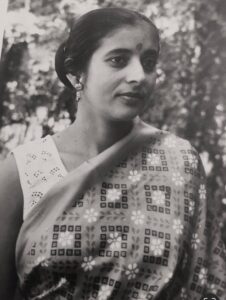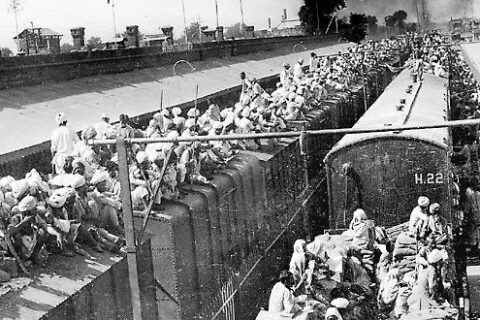My Mother’s Partition Story

April 11, 2023 will mark the seven year anniversary of my mother’s death. After all of the generational trauma work I have done over the past many decades (and continue to do), I submitted an excerpt of my article, The Daughter of a Partition Survivor Speaks, to #BrownHistory on Instagram, a site that features stories and articles of the Indian and Pakistani diaspora.
They published it on their site and it received nearly 12,000 acknowledgements, 200 comments, and potentially 100,000 views in 4 days. I could feel the love for my mother flowing towards her from the world, and am so grateful for the collective acknowledgment of her intense and complex trauma and anguish she lived with throughout her life.
Please feel free to go to #brownhistory on Instagram to acknowledge her, during April, the month of her death anniversary. I am dedicating this month’s article to my mother, Adarsh Kumar, a 1947 Partition survivor who suffered greatly at the tender age of 11, at the hands of divisive violence. The justice I seek for my grandparent’s murders and my mother’s anguish can only be gained through love, transformation and healing. I have dedicated my life to serving this, and feel honored to continue the difficult and sacred work of healing my complex personal and generational trauma.
Namaste.
My mother suffered in silence. She was unable to speak of the horrors she witnessed when she was only 11; her parents and oldest brother were killed in front of her eyes in a train headed to New Delhi which was ambushed and massacred in the Partition of 1947.
The images inside her head had a life of their own. Being one of only three who survived that night, she carried intense survival guilt. In her mind, she never left that train. When she and her 2 siblings got off that train, they hid in the fields.
When rescue arrived, the family of the rescuer wanted them killed and discarded for fear of being caught with children from the ‘other side.
Why did she survive? She asked herself this question everyday of her life. My mother’s coping strategy was such that she could not allow herself to feel pleasure or joy for too long, sometimes only for minutes before she would shut it down. I can’t imagine what she felt as she witnessed the unthinkable.
My mother died suddenly and unexpectedly in 2016 at age 80.
After her death, we uncovered accounts that she had written a few years before, to give her pain a voice. She expressed how difficult it was for her to write about it. It was intensely painful yet imagine, also freeing for her to some degree.
My father was her only safety, her rock, yet she had a complicated relationship with him. Her struggle with him, I believe, was due to her conflict between her survival guilt and her will to live. He made it safer for her to be in a world she did not want to be in. He offered her a sense of belonging. She reluctantly accepted yet struggled with it every day.
My mother spent the last week of her life with my dad in Krakow, Poland, the epicenter of the Jewish Holocaust. The day before her death, she visited Schindler’s Square with him and wept in his arms for the loss of her mother. In the Square, surrounded by pictures of Holocaust survivors, she finally felt acknowledged. It was powerful enough to shift her identity from victim to survivor. It was the closest she ever felt to being understood. My father says she was very happy on the day of her death. My hope is that she felt more whole.
submitted by @rose_kumar
©April2023 Kalpana (Rose) M. Kumar M.D., CEO and Medical Director, The Ommani Center for Integrative Medicine, Pewaukee, WI. www.ommanicenter.com Author of Becoming Real: Reclaiming Your Health in Midlife (2nd Edition), Medial Press, 2014. Dr. Kumar is currently accepting new patients. Call 262.695.5311 for an appointment, either virtual or in-person.

